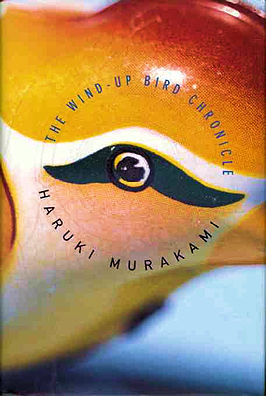Our book choice for October 2004 is The Wind-Up Bird Chronicle by Haruki Murakami. It is a sprawling, multi-layered novel that explores themes of loss, memory, and the nature of reality. The story follows Toru Okada, a young man who is searching for his wife, Kumiko, who has disappeared without a trace. As Toru searches for Kumiko, he encounters a series of strange and surreal events that lead him to question the very fabric of reality.
The novel is divided into three parts, each of which explores a different aspect of Toru’s journey. The first part, “The Thieving Magpie,” begins with Toru being tasked by Kumiko to find their missing cat, Noboru Wataya. Toru’s search for the cat leads him to a series of strange and disturbing encounters, including a visit to a well that is said to be haunted by the spirits of the dead.
The second part, “The Underground Man,” follows Toru as he investigates the disappearance of a young woman named Malta Kano. Toru’s investigation leads him to a group of people who are involved in a bizarre occult ritual. During his investigation, Toru also begins to question his own sanity, as he begins to experience strange hallucinations and visions.
The third part, “The Birdcatcher,” follows Toru as he travels to a remote village in the mountains of Japan. Toru’s journey to the village is a quest for enlightenment, as he seeks to understand the meaning of his own life and the nature of reality. As Toru gets closer to the truth, he begins to realize that the well is not just a physical place, but also a metaphor for the subconscious mind. The well is a place where dreams and reality intersect, and it is a place where people can confront their deepest fears and desires.
The Wind-Up Bird Chronicle is a complex and challenging novel, but it is also a rewarding one. The novel is full of Murakami’s trademark magical realism, and it explores some of the most fundamental questions about life, death, and the nature of reality. The novel is also a powerful meditation on the nature of loss and the power of memory.
The message of The Wind-Up Bird Chronicle is that the past is never truly gone, and that it can always come back to haunt us. The well is a symbol of the subconscious mind, and the novel suggests that the subconscious mind is a place where the past is stored. When we confront our past, we can either be destroyed by it or we can be transformed by it.
The novel has been praised for its originality, its rich symbolism, and its exploration of the dark side of human nature. It has been translated into over 40 languages and has won numerous awards, including the Yomiuri Literary Prize.
Discussion Questions
- In the first third of the book, did you think Toru was a bum?
- What did the cat leaving represent?
- What did the cat’s return represent?
- Why did May Kashahara leave Toru in the well?
- What did you think of Malta Kano? Of Creta? What did they represent?
- What did the blueish mark on the face mean?
- Did it bother you that Malta and Creta Kano were not in Toru’s life in the last third of the book?
- Who was the Faceless man?
- Who was the woman who made the strange phone calls in the beginning of the novel?
- Was the well good or evil? Why was it dry? Why did it fill with water at the end?
- Who, symbolically, was Noboru Wataya? Why was the cat named after him? Why was he evil?
- Why did Kumiko leave her husband?
- Why did Murakami spend so much time dicsussing the war in the 1930’s and 40’s?
- Did things come together in the end?
- Would you recommend the book?

